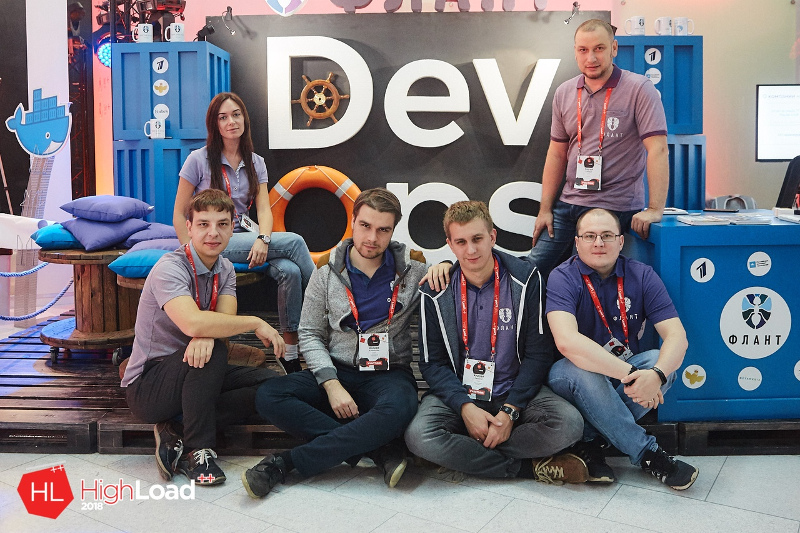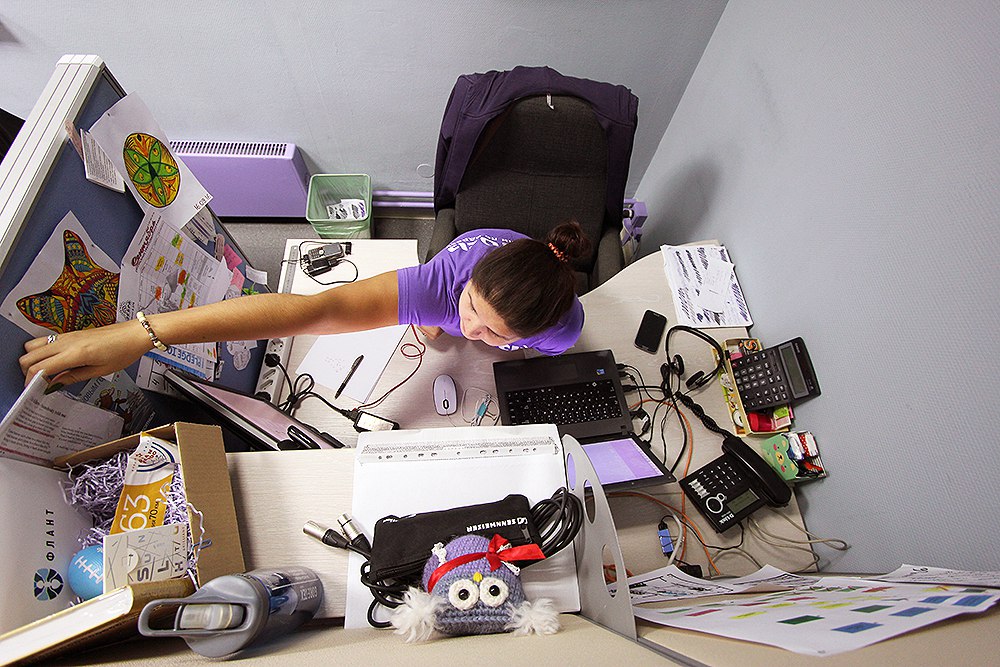“Atypical attitude to finance” - that if employees themselves will manage income. Conversation with the flan

In a world where only your business can make you truly rich, people still go to work for hire. Firstly, not everyone is happy to be businessmen, but we must live. Secondly, at work everything is clear and safe - you fulfill your function, and most of the risks are assumed by others. From here grow old muddled conflicts: the owners want employees to be motivated, as if work is their own business; employees want to do what they are paid for, and no more.
These classic relationships have variations - options, interest, bonuses, which are a bit like the owners and employees in the same boat. But there are more atypical situations.
')
The company Flant consists of several teams of devopos, which serve other turnkey production. They grew out of a gang of enthusiastic students and fans of Linux, and now they have built a structure of “business within a business” simply because it’s more comfortable and more honest. Dima Stolyarov and Sasha Batalov told us how it works.
Flant was ranked as the best IT employer in 2018 with an average rating of 4.68. Judging by the company’s estimates on My Circle, employees believe that the company makes the world a better place, and still value Flant for interesting tasks, good teamwork, modern technology and communication with top management.
A gang of Linux students
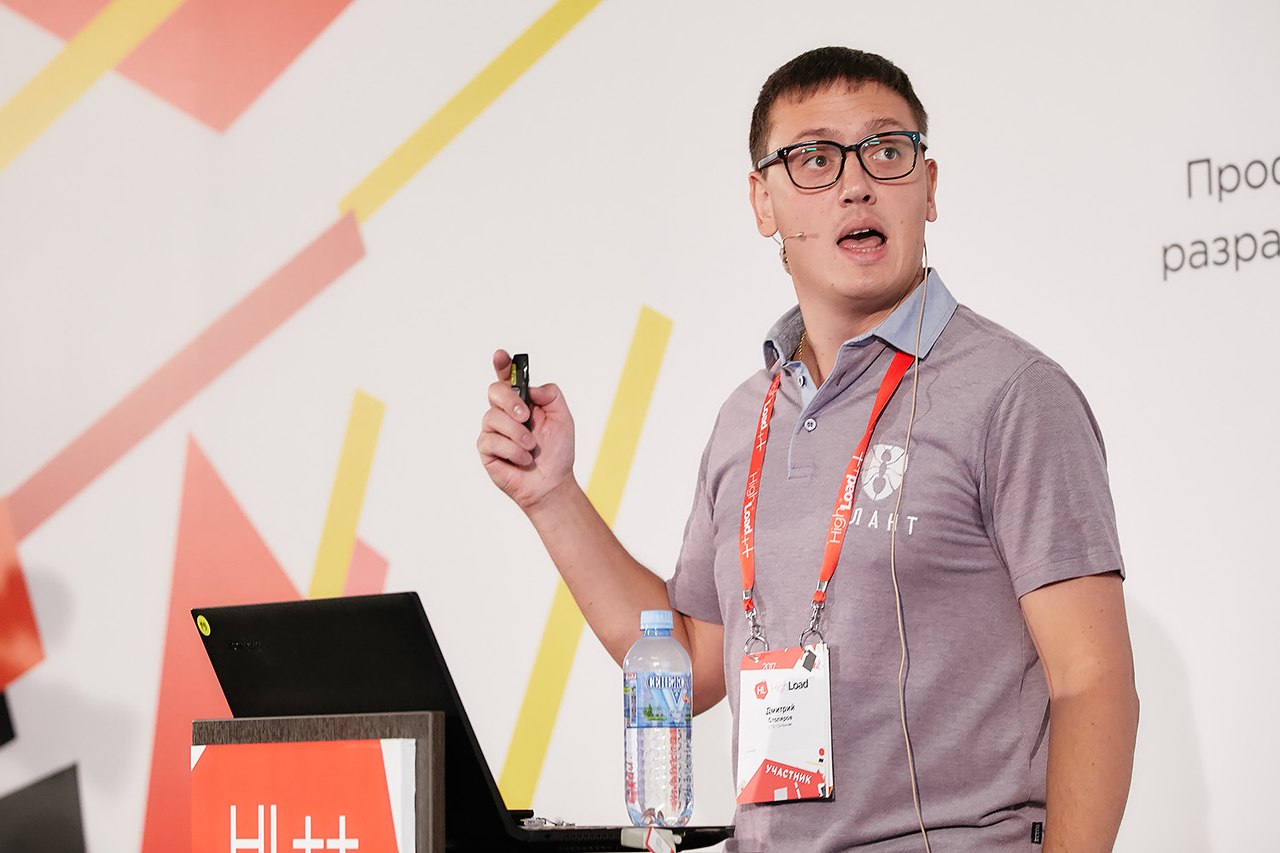
Dmitry Stolyarov (Technical Director) during his report
- (Dima Stolyarov) We have always been engaged in Linux and open source, but we started with a very funny topic, for which we are now a little ashamed. For some reason we thought that it was necessary to introduce Linux into offices instead of Windows. The company's first name was TrueOffice - “true office”. Then we realized that no one needs it. It was in 2006, I was 19 years old. Only in 2012-13 did the awareness come about how to do business, what technologies the world needs.
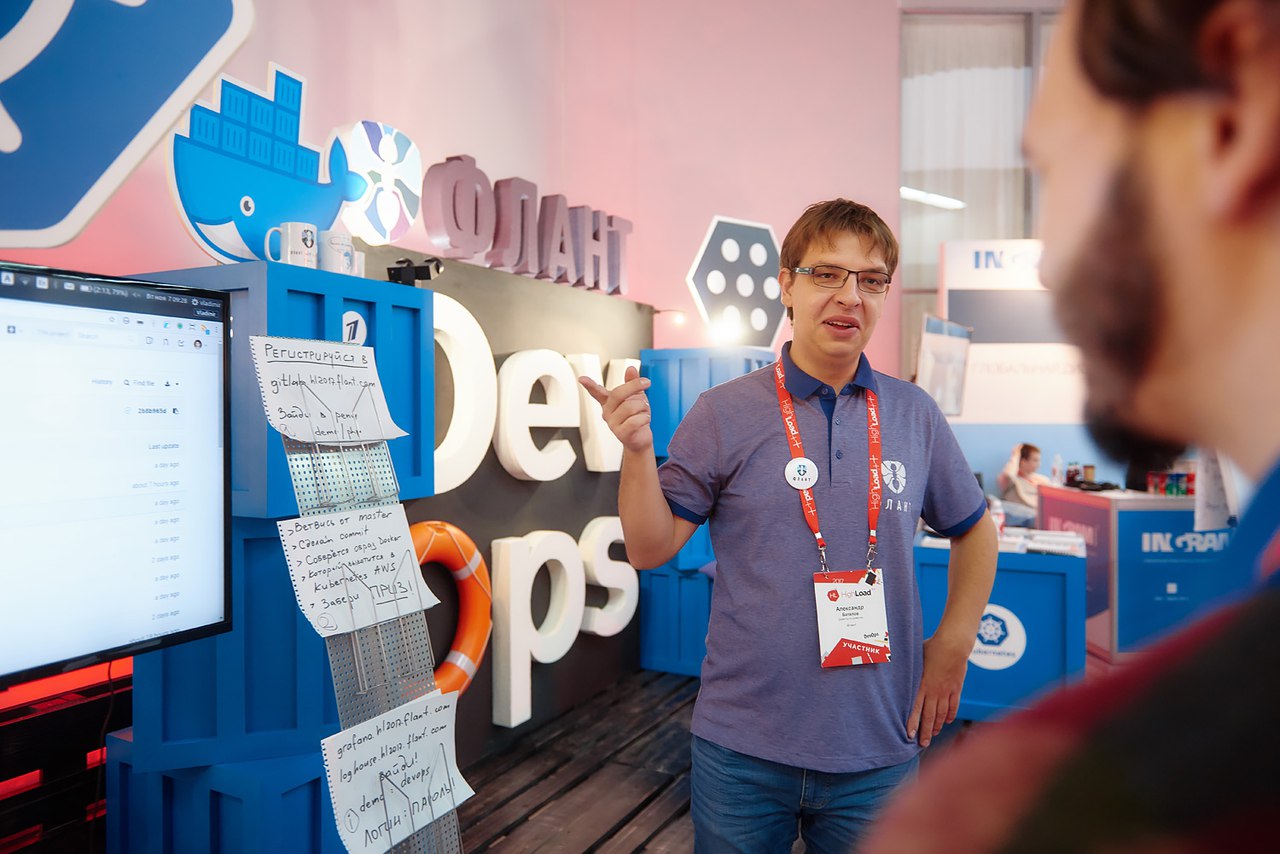
Alexander Batalov (CEO) at the company's booth at the conference
- (Sasha Batalov) In addition to technology, there is a huge reservoir in the form of marketing, sales and economics that no one has ever taught us, except for courses at the university, but I do not know how they are generally applicable and useful.
At first it seemed to us that all this was not necessary, but then we had to comprehend in practice, read books, sometimes after the bumps were full. In general, we walked a long, thorny path, tried a bunch of everything wrong.
- (DS) But gradually, as qualifications grow, everyone already specialized in Linux, and now we only deal with the highload, high-load web projects. And when Kubernetes appeared, we quickly realized that this is the very foundation that was so lacking.
- Why was there such an interest in Linux? Ideological or technological?
- (DS) The company has two founders - Dima Screw and me. Dima Shurupov had more interest in open-source. And I liked Linux, technologically, how everything is arranged there. And the combination came out: Dima likes the ideology, and I like the technology. I love the open source as an idea, but the technological side has always been more important to me.
Einstein said: "It is necessary to do as simple as possible, but not easier." Here Linux is built so simply, reliably and transparently, that I enjoy it. We all liked it, and we were turning from a gang of students into a big company. Now we are 70. For IT, for specialized services, this is quite a lot.
- How was it during the time of the gang of students?
- (DS) Well, as usual, students have - fun and perky.
- (SB) A huge amount of altruism, the desire to conquer the Internet, to conquer technological heights. We got involved in very difficult tasks - it happened that we took up serious (but very interesting!) Projects from the field of system integration, making them for a penny. They tried to make their frameworks, absorbed all the technologies that they learned, and immediately looked for their use.
- Did it work commercially?
- (DS) Yes, but in the early stages we did not need anything. In those days, for me, 40 thousand rubles was an absolutely normal income, I chic on them.
- (Sat) And I thought that for a thousand dollars you can make any site that you can imagine.
- (DS) In 2013, we had no money to freely hire in Moscow. All the friends who could take, we have already taken. We decided to open an office in Nizhny Novgorod. We went there, opened, began to hire. Then they realized that it was hard to live in two offices, and decided to live without offices at all.
Of course, they made a bunch of cones. Only in 2016, to my shame, I read the Remote. I cried and laughed because we made a one-to-one journey. Each paragraph intersected with my personal experience.
- (Sat) In every paragraph we had our scars.
What flant does
We have turnkey services for high-load productions. This is different from regular outsourcing, because we live with clients for a very long time and we work very closely together, people trust us with one of their most important things. Their business depends on how we work.
To form a quality production operation, you need 15-20 devops, database specialists, Kubernetes, customer support, and so on. And if the company is small, where there are only two or three dozen developers, it is impossible there. And here we come and save. Thousands for 150.
Previously, we had a mission to make a company in which we ourselves would be comfortable working, no matter how silly it may sound. Now that this has happened, the mission is to make Google and Facebook technologies accessible to small businesses and start-ups in the early stages.
People can focus on their product, rather than overcoming problems that can not be overcome.
Many guys who come to us are surprised - how much is different, what are the loads everywhere. We have more than 50 projects in production, more than 70 clusters of Kuebrnetes. It is always possible to turn up this. He opened the graphic artist, drew microservice architecture, made a list of 200 technologies - and went. But it always leads to problems and consequences.
The trick is, on the one hand, to ensure maximum stability, reliability and simplicity, on the other - a high level of innovation. Well, we are proud to do this. We do this everywhere and massively, as a conditional Ikea.
Who needs outsourcing devops?

- It seems to me that big companies prefer to keep devops in the state.
- (SB) It is clear that large players, like Avito or Badoo, can recruit a staff of devops. Small companies with huge investments can also - but they will gain, and not the fact that they have enough strength to cope.
We believe that even large companies are better to contact the experts who ate this dog. Small companies that have a business in a web solution just need to contact experienced people. Because any idle time in a key system is a loss of money.
- (DS) We know that people in Russia are afraid of outsourcing - because of negative experiences, for other reasons. But customers do not leave us. For ten years, leaving only for two reasons. Either they outgrew us (for example, they were bought and everything was rebuilt), or they were closed, because the idea did not work.
- And who comes to you more often - small companies or large ones?
- (DS) Now the same. But the little ones are just afraid of us, they think that we ...
- (Sat) ... big, complex, unattainable and soar in the clouds.
- (DS) Well, yes, you go past the salon with Maybach and do not go inside, do not ask the price, because well, Maybach cannot cost 500 thousand rubles.
- Of course it can not.
- (SB) But as soon as he appears in a car sharing, you can afford to ride it.
- (DS) Yes, we, of course, are not Maybach - we are Ikea. We also got easy, reliable and affordable. In general, the number of companies from TOP-50 and small companies that apply to us is the same. But we mainly rely on small business and we work mainly with them, and we try not to cooperate with large ones.
- Why?
- (DS) A lot of bureaucracy.
- (SB) In a large company there are many levels for which responsibility is distributed, the feedback is very long, and often people start to play technology: “But let's weigh it, let's write a strategy, plan for the year ahead, let's do it better for an enterprise culture, this is how our practice has developed. ” And here they begin to complicate things that can be solved in a simple short way, so that 80% of the result will be tomorrow. They go a long way, where it is not known whether it will work at all or not.
As a result, instead of well-established practices, we reinvent the wheel, and the cost of the technological solution becomes incomparably higher. The quality is not the fact that it will be better.
Outsourcing fee
We have a lot of projects on Gitkhab, we are all actively contributing history to the open source. Not only in their own - in others too. We try to share the tools we use every day. We believe that it is our duty, and we are very pleased to do this.
All the guys in the company one way or another kontribyyat - or reviews, or documentation, or code. We believe that this is our payment for the entire rich world of open-source utilities that we use. And I think we pay this fee worthily.
We call it experience condensation. Initially, one person learned something, fumbled with colleagues, the experience became folklore. Then we wrote down the documentation, and then dragged it into utilities and forgot about the existence, because we don’t think anymore - everything is automatically taken into account.
The popularity of technology and the toxicity of developers
- Why Ubuntu? Before you chose it, what else have you considered?
- (DS) We were a gang of students who like Linux. And we have been using Gentoo for a long time - this is a source-based distribution, and it must be compiled from scratch every time. When we had a couple of hundred servers, the update took months. We, of course, first automated and optimized everything, but in the end we realized that we needed to change something, and, knowing the pros and cons of various solutions, we simply took the most popular. Then it was intuitive - once the most popular, it means it will be best to develop, and all the flaws will be corrected sooner or later.
There was such a database Resync DB. They competed with MongoDB and started at about the same time. And for a long time, Resync was technologically better.
When users came, they tried to solve internal system problems, and in MongoDB they were solved much less, but could conditionally instruct if to be better in synthetic tests. Therefore, the popularity of MongoDB grew. On the most simple cases, they showed themselves better, but inside were figs. And the Resync DB inside was good, but it was not growing in popularity.
As a result, MongoDB inside everything was fine, and no one remembers Resync DB. The company went bankrupt. Ubuntu has a story like this. There is a lot of focus on this distribution, so we decided to use it.
- How do you like the latest political changes, CoC and all that?
- (DS) Well ... there is no negative, everything is fine, everything is clear. I myself suffer from the fact that sometimes I hurt people. For example, the thing seems obvious to me, and it begins to enrage me terribly that people do not understand it. I'm angry, and it turns out one negative (but I work on it).
Linus is very clever, after all he has been working with this for 30 years. It is clear that he is a sharp dude, he does not climb into his pocket for a word. Politeness suffers from him, and the community is working on it. He himself understands and acknowledges everything.
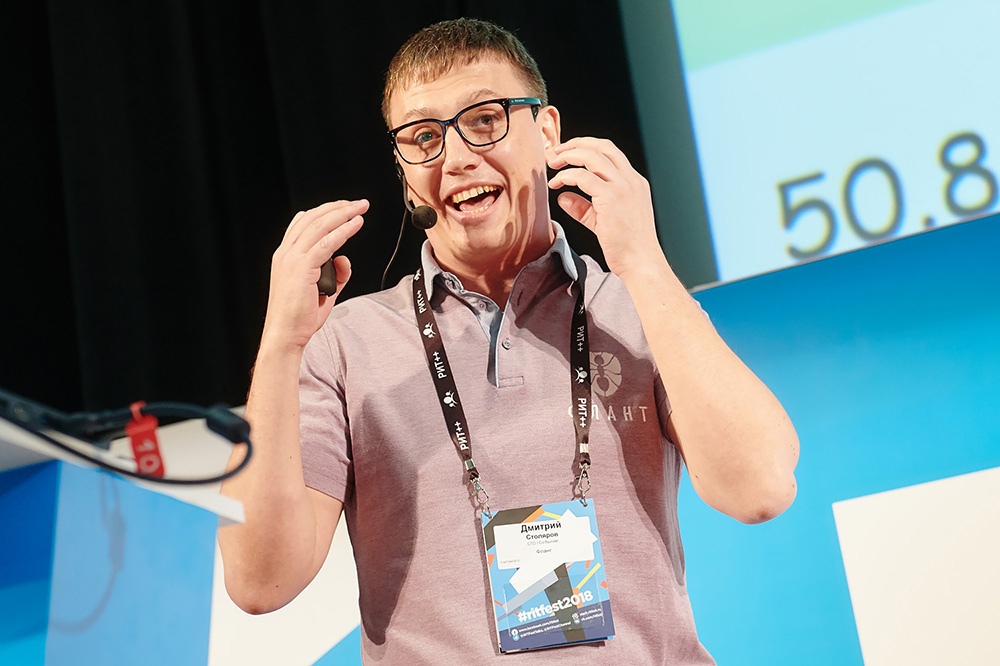
- But, as I understood from the reaction in the discussions, many people support the idea of speaking directly and harshly, and if someone does not like it - not sugar, they will not melt.
- (DS) No, it is not. I, as a person suffering from a lack of politeness, understand that this is very bad. It spoils the community. There are people who do not care, but most people still need to have emotional comfort.
There is a stupid mistake in the code. You can write: "Guys, it's bad that we miss such simple things, we need to fix it." And you can write: "What idiot did it ?!". One phrase. The person who made this mistake may be even smarter and more experienced than you, but was simply out of sorts when he was mistaken - you never know what happened to him. And for him it will be a direct insult. Why do you need it?
You need to say things straight, but you don’t need to say "What an idiot wrote it." It makes no sense to hide and envelop, but there is no need to offend people.
Why do devops call each day
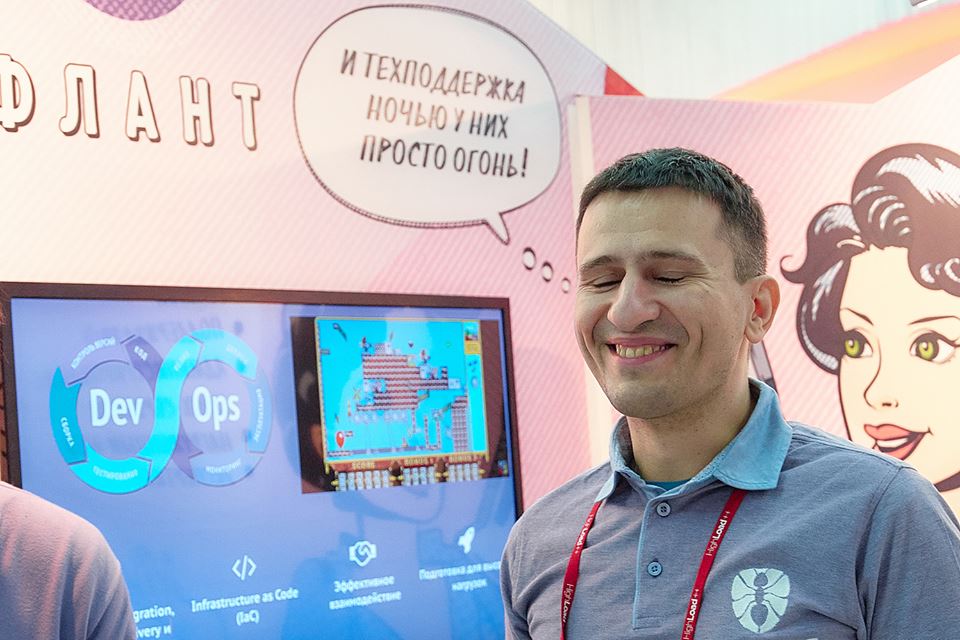
- (DS) Now we have one small office, where the documents lie and the office manager sits, who handles these documents.
The company has 70 people. 20 people is an OPS team. 30 people are three DevOps teams of about 10 people each. The remaining 20 are developers and sales. 8 developers, rnd department - 4 people. Non-technical people for the whole company 5-6 people.
The key money is earned by three DevOps teams. The processes are the same everywhere - a long rally every day, for an hour and a half. But there all technical issues are dealt with, and the guys decide what to do next. And since everything is remote, this is an opportunity to communicate normally.
- Is it really necessary every day?
- (DS) Yes.
- With this, everyone agrees?
- (DS) Yes, everyone agrees, everyone is comfortable. But in some days the rally can go 30 minutes. Despite the very intensive communication in Slak, I still want to synchronize well, to understand what happened yesterday. We want to understand each other, not just tasks to click. This is a culturally important moment.
- (SB) At any moment something may happen, the situation may change. Constant adjustment is needed.
- (DS) You have a good anecdote on this topic.
- (Sat) Yes. The heart surgeon comes to the auto center, and the mechanic says to him: “Listen, we are doing the same thing, only you operate the human heart, and I am the heart of the car. You get $ 10,000 for the operation, and I pay 100 rubles for the service.
The surgeon asks: “Do you also want to receive 10 thousand for repairs?” Such a mechanic is, of course. The surgeon sits in the car, starts and says - "go through".
Also with us. In the development, you can take the task and bring the result in two weeks. Then everything can be corrected, because plus or minus three days does not affect anything.
And in our case, each missed alert or the wrong decision on an alert can turn into a very big problem. To avoid this, we need close, fast, constant communication.
Is it hard to go remote?
It's hard to manage people remotely. But it is hard as long as you are in one office, and they are in another, and there is an obscurity of consciousness. You are sitting in Moscow and it seems to you that the boys from Nizhny are working poorly, inefficiently. In Moscow, you see the efforts of the people around, but the efforts of the remotes are not. You only accept the result.
In the office, a lot of communications are going in an unformalized form - someone said something to someone on the way to the kitchen. People in another office do not see it, do not feel it, and the context is lost.
By the time we were ready to give up the office, all communications (even for employees in the same room) were going through Google Meet. And when we built all the communication remotely, it earned 100%, all the barriers of misunderstanding were removed.
Everything is difficult to build, but if everything is done correctly, it works and does not cause any discomfort.
How the teams manage their money themselves
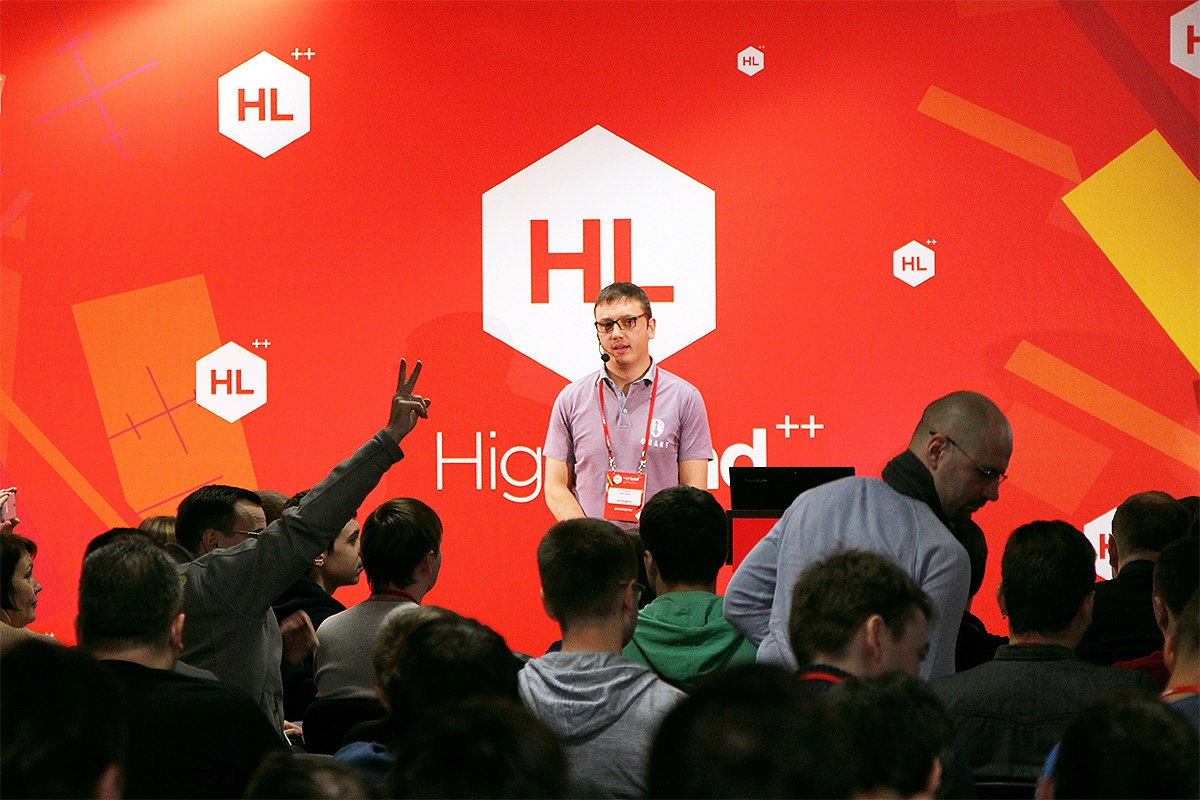
- Udalenka - controversial question. Sometimes companies are afraid to let people go home because they think they will lose control of them. But those who let go, they also say that it is necessary to work quite differently.
- (DS) We decided this problem by the fact that we are ready to share money with the teams. Our whole economy and motivation system is built almost like a franchise. Salaries are quite high, plus we leave the guys free money.
The team maintains a pool of projects. They know how much each of these projects makes money. They know their share of this money. All the money that remains above their salaries remains in the team and is divided between them according to a certain system. The motivation is absolutely direct - they took the project for another 200 thousand, they added another ten in salary. Made a mistake - it is necessary to compensate the client.
- (SB) If you start to let the guys down, then it is immediately felt. You are depriving yourself of the opportunity to receive additional income. And our system solves the problem of control completely. A person makes a plan for himself every day, and there are enough daily meetings to understand who does what.
- (DS) In the conditions of hostilities, comrades in the trench do not lie.
- So, you have open salaries? Everyone knows how much gets?
- (DS) We closed salaries some time ago. There is a regional difference. Despite the fact that we are striving to pay fully Moscow salaries in the regions, there is still some dissonance.
- (SB) Now everyone knows how much money the team has. They see what percentage of the bonuses they get.
- (DS) Timlid each team decides how much their guys will receive, and how to distribute bonuses. We get into this question exclusively with the advice, the solution is always behind the team leader.
Why people are afraid of vacancies
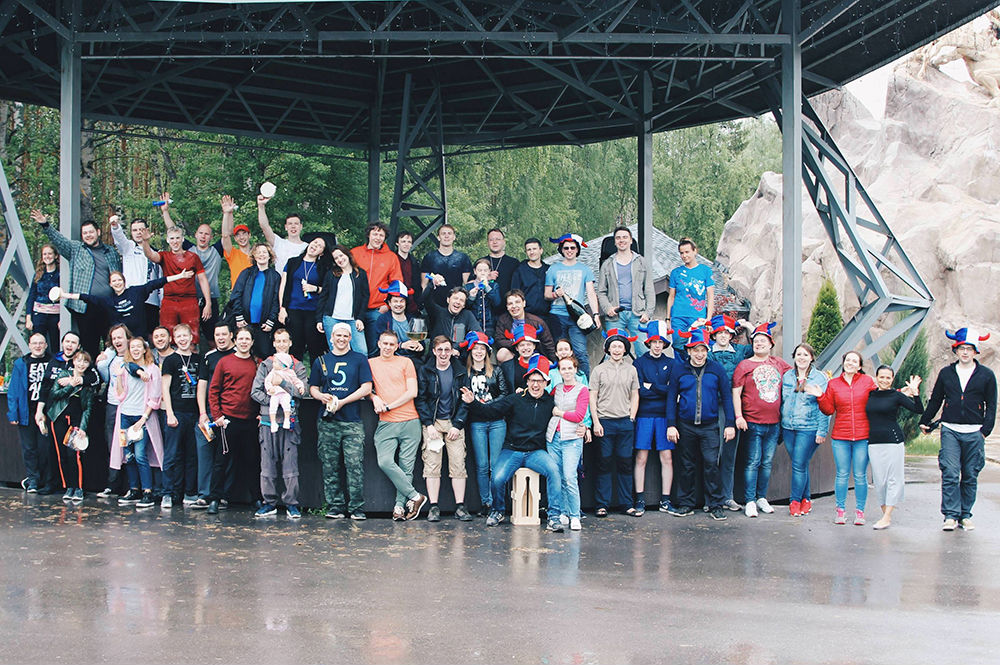
Celebration of the 10th anniversary of the company in 2018
- 70 people you have enough?
- (DS) No. We have a plan to take a minimum of 20 DevOps engineers in a year. But it is very difficult. We have a sufficiently large pool of candidates, everyone knows about us anyway. But here the story is like with customers. Many people say, "we are afraid to work for you, suddenly we will not pull." But we do not think that we have super cosmic things here.

Correspondence with the candidate
- What should be to pull?
- (DS) Theoretically, a person should be evenly developed in development and operation. In practice, there are very few such people in the world, not to mention Russia. Especially those who are senor both there and there. I would not even treat myself to them.
Our vacancies are always well written what you need to know. We work on them a lot and try to write on the merits.
- Can vacancies really scare away if it's written, how much should you know?
- (DS) No, no, no, we do not think that we need to know much.
- (SB) We are not interested in knowledge, but in thinking, the ability of a person to seek solutions.
- (DS) Interested in the experience in Linux, and we check it with fairly simple tasks - just a large number. Our test is quite long, for an average candidate, it takes 8 hours. And according to the results, we look at how a person coped with problems, how googles, what his outlook is.
We can gain knowledge very quickly, because there are a lot of different projects and experienced colleagues who will always prompt you. Therefore, we look first of all so that the guys will quickly understand and have experience.
- Besides the test, do you somehow reveal it?
- (DS) We have three phases. First communicates Eychar, asks to tell about the experience. Then those who liked Eicaru pass a test task. According to the results, tmlids communicate, and they tell Eichar their opinions, and if they are unanimously good, this is a reason to make a person an offer.
500 thousand rubles to hire the future superman
- (DS) We have a very atypical attitude towards finances, we share with the teams and are not greedy. And we give the team 500 thousand rubles for state expansion. That is, this is a grant so that they can find a person, teach everything, while he joins.
- 500 thousand per person?
For a team to make a lot of money, they need to take more projects. For this they need more people. And in order to take more people - you need more money. It's a vicious circle. To break this circle, we give money for a new person. While he is pouring in, they can earn more projects and pay him a salary out of that money. That is, this compensation, while the newcomer does not make money.
- Is it too much for devops? They are loaded every day, every day in combat conditions, and they also have to deal with financial management.
- (DS) This is a timblid, and he is not quite a devops. The Timlides are more likely to partner in order to have options. Therefore, we believe it is normal for them. And ordinary guys in the team is not affected.
Roughly speaking, they know - if a colleague falls off, the next month they get his salary. Of course, they will have to work more. And when they find a replacement, give him the money back.
And when we give the team of 500 thousand, they do not want to take a person who does not shoot. And sometimes it's easier for them to weed out 20 people and take one. It was so that 100 people communicated with Eychar, 30 of them went to the technical assignment, 20 passed, and all but one of them were eliminated. This is tin. Timlides are very afraid to take risks. We discussed the topic, and everyone seemed to understand that this was a mistake. Many people express themselves in an interview in a different way than they will work. Therefore, we must give a chance and risk.
- And the Timlids are not starting to abuse? You get 500 thousand, you don’t hire for a very long time, you get another 500 thousand.
- (DS) They get paid once. We say - “You now have ten people, but you need 11. There is a sales plan, more projects will come and you need to be ready. That's 500 thousand for the eleventh position. ” The second time you will not get them. And if someone leaves, this is already a team problem, they solve the issue within their budget.
It is like a monopoly game.
- (SB) We believe timblid should be immersed in finance. We have people get their salary from the money they earn. And the degree of the cost of the project is very important. The client comes with one infrastructure, and in a year his infrastructure is 10 times more. And if the team leader does not participate in finance, he will not be able to adequately estimate the cost of the service.
- (DS) It happens that a team is at war for several months with the client’s problems, realizes that they are paid a conditional hundred thousand for it, and this does not correspond to what is happening now. And no matter how painful it is, they must either raise the price or part. And the guys make these decisions themselves. Given that they are all remote. And we think this is our greater achievement. We have truly autonomous motivated teams.
- Yes. And from this it sounds like you have to be a superman to work for you. And technical skills, and self-discipline, and financial literacy.
- (Sat) We can become a superman. But even those tmlids who are able to do this came from ordinary engineers. A year or two is enough for a person to turn into such a superman.
- The Timlid partners have grown from ordinary engineers. And can they immediately be hired for such a position?
- (DS) We haven’t had one yet, everyone grew out of engineers. But we are considering a case to unite with a small company, which will become just another of our teams. We would like to try this.
- You can take a person if he is a good engineer, but not organized enough for the level of such teams?
- (DS) We are not afraid of unorganized people, we have the same flow of tasks. It is quickly revealed whether it is possible to help a person to organize. If he tells every day what he did, without doing anything in reality, he will be ashamed.
When you see that everyone is sitting in the same boat and rowing, it’s uncomfortable for you to throw the paddle. In such conditions even unorganized people become organized. Well, if not, then no.
We terribly do not tolerate superficiality - in people, in business and in ourselves. And getting here, people are developing very quickly, about three times faster than in any other place. We really have three years for the experience and skills.
We do not like superficial midles. From our point of view - Middle is a person who can already do a lot. I will say it is - the DevOps market is terribly smeared. There are midi who consider themselves to be juna. There are djuny who consider themselves seniors. A person, coming to us, very quickly realizes his real level.
This does not mean that we do not take June - we take with pleasure, and we will take even more. We are already creating a special team “DevOps-accelerator” and allocating there projects where you can take risks, where the client is ready for us to take risks. Probably, even a special service under this will appear. Some kind of "Flant-light".
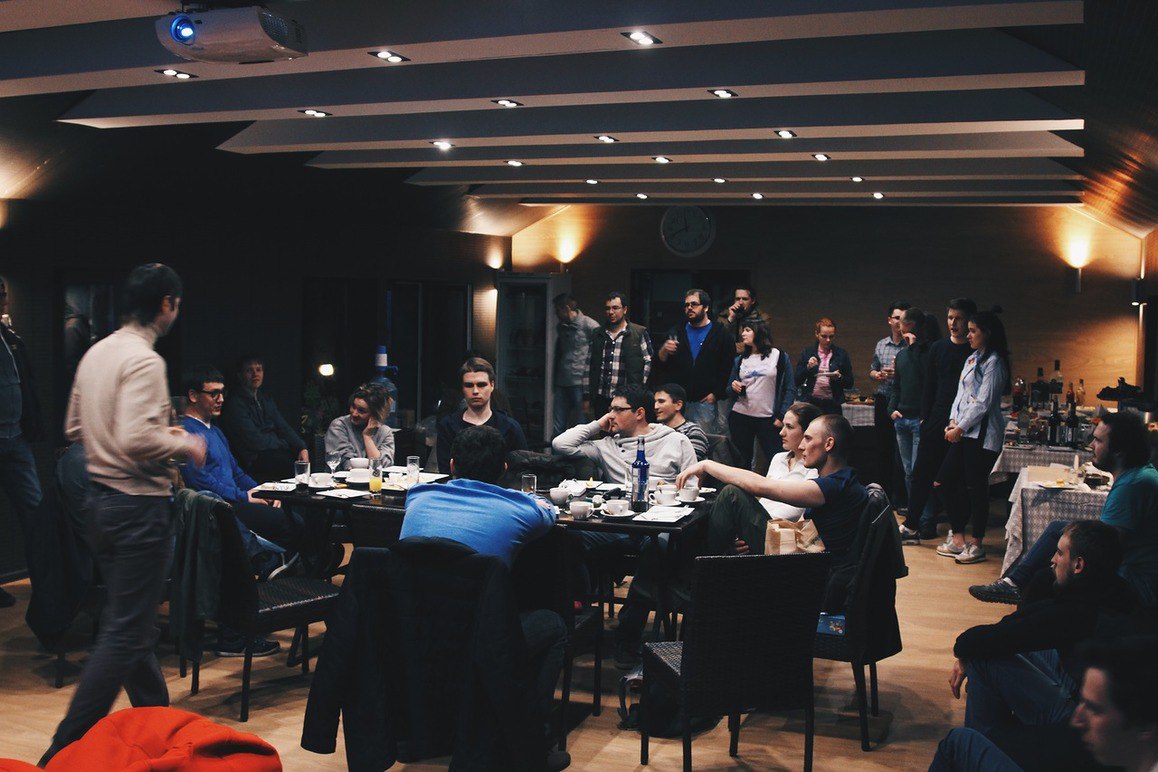
- Would you like to become a big corporation?
- (DS) We would like, but with one reservation. I really don't want to lose my culture. We will definitely grow, but preserving the technical and working culture is even more important than development itself.
We have one life, you still won’t earn all the money, but you want to live it along with good people. We are totally unacceptable bureaucracy, simulation of useful work. We have absolutely horizontal connections. It is possible and in the most drastic form to convey your idea to the leadership: the essence is more important than formalities.
- (SB) But for this you need to have very good arguments.
- (DS) Certainly! And distant work is also needed, because we live this way, so we see the world. Dima Screw lives in Thailand, I am in Germany. Sasha Batalov in Moscow, Eychar-director in Tyumen.
We believe that living on this planet, I want to live my life by looking at it. To live in conditions where it is unpleasant for you to go to work is not necessary. Therefore, we want our work to be wanted. Conflicting at work is definitely unpleasant, so we make sure that there are no conflicts at work. We have disputes and battles, but not conflicts.
- Do not you think that to become big means not only to provide services, but also to produce. What is necessary not only to live life and see the planet, but also to leave something?
- (DS) This is a very sore subject for us, because we are a service company. But we do a lot of software, and in fact our product is services with a completely different efficiency. We never sold watches or people to anyone. Always customers came and asked - "can I buy a hundred hours?" No, it is impossible, we do not sell watches.
We sell the result. The result is that we removed the pain, solved the problem. And we decide not the way we were told, but as we know. Our product is our experience. And we will definitely make ready-made solutions, SaaS products, there are a lot of ideas. But there is no hurry. There are many decades ahead.
Source: https://habr.com/ru/post/444712/
All Articles
